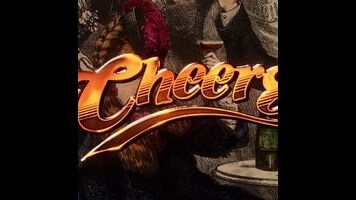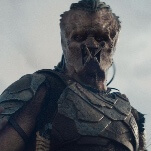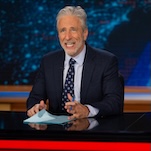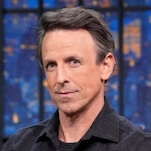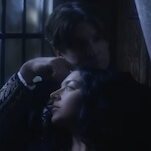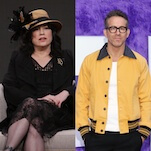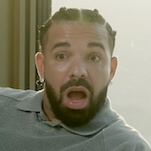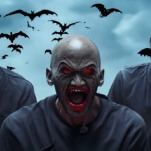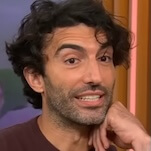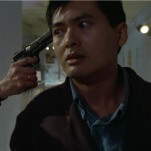It says a lot about Cheers and the clientele it draws that even its most unsavory customer is willing to step up when one of the bar’s own is in need of assistance. The most heavily plotted episode of the series we’ve seen thus far, “Pick A Con, Any Con” begins with the revelation that Coach has been fleeced to the tune of $8,000 by his “friend” George. In the first of many twists to come, Coach divulges his debt after a cold open where the all-too-gullible Diane remarks on how nice it is to watch Coach interact with another member of his generation. Not willing to see his friend, mentor, and employee left destitute, Sam takes drastic action: He bails Harry The Hat out of jail, summons him to the bar, and invests $5,000 of his own money in a rigged poker game with George—who’s actually a big-time con artist from out west known alternately as “Eddie The Mole,” “Mole Man,” “Moley,” or by the nickname he earned in Philadelphia, “Sid.” (Why Sid? “Philly’s a dull town,” Harry wryly explains.) There’s a sense that Harry is merely acting under onus to Sam, seeing as the bar owner helped cut short Harry’s recent stay in police custody—but the con man is also bound to a sense of loyalty to Cheers. Or, as he memorably puts it, “I don’t like the idea of someone else plucking my pigeons.”
And that’s why it feels like such a punch to the gut when, six minutes later, the victorious “Mole Man” reveals that he orchestrated the whole poker game in concert with Harry. It feels a little fishy, but it’s still hard to watch a smirking Reid Shelton make his way toward the door while explaining that he and Harry pulled the wool over everyone’s eyes. But (spoiler alert) pay close attention to who initiates the final five-card face off between the two hustlers: It’s Coach, the easiest mark in the bunch, who eventually turns out to be the co-architect of the episode’s ultimate “double cross.” Until to that point, “Pick A Con, Any Con” takes Coach’s stupidity to the limits of its believability. Even at that late hour, could he really be dense enough to announce his signal to George and actually misuse that signal, causing the gang to lose all their money to Harry? Turns out the answer is “No,” and his joyous laughter at the actual outcome of the game proves a wonderful moment of redemption for the character. A redemption aided by Harry The Hat.
An episode like “Pick A Con, Any Con” is a tricky prospect, as it’s all too easy to leave behind loose strands and unsatisfying conclusions with a plot that bobs and weaves in sync with various con jobs. But every setup gets some degree of payoff in the end—even those as insignificant as Sam’s warning Harry that he’s never again to walk through the bar’s front door. (When Harry re-emerges at the end of the episode, he does so through the pool room.) Of course, this is my first time watching “Pick A Con, Any Con,” so I was all too eager to follow the script’s various misdirections. For those of you who’ve seen it before, is “Pick A Con, Any Con” as gratifying the second or third time through? Or does Harry bursting back into the barroom undermine everything that’s come before?
The biggest difference in my reaction to seeing the episode again is that I remember a very different person who used to go by my name who liked Harry Anderson. Even before he started doing his snappy-patter act on Cheers, Anderson had used it a few times on Saturday Night Live; he seemed to be part of the retro-hip “New Vaudevillian” crowd (i.e., Penn And Teller, Bill Irwin, the Flying Karamazov Brothers), and I usually got a kick out of him. Now, he just looks (to me, anyway) like a smug, baby-faced grad student who needs to stop dropping all his bread at the vintage apparel store and get over his infatuation with Damon Runyon. The amazing thing is that when he graduated to sitcom star onNight Court, he had it in him to get even blander.
We haven’t talked too much about Cheers’ cinematography as of late, but I couldn’t help but be struck by the way in which George is framed during his final hand with Harry. He’s got Diane, Sam, and Norm behind him… but there’s also the inky black of the bar after closing time, when the expansive, warm nature of the establishment turns into isolation. It feels like George’s presence cools the bar, and we can’t wait to get rid of him. That’s why Coach’s ultimate role in things, while a stretch, also feels so much like a balm. There’s a difference between being simple and being stupid, and the predicament Coach finds himself in has more to do with his trusting nature than anything else. To see Harry realize there are people in this world worth helping, not conning, speaks more to Coach’s inherently sweet nature than anything else in the show’s early run.
EA: You can get a good idea of how atypically plot-heavy this episode is just by the amount of space I needed to unspool the beats of the story in the intro.
Donna Bowman: Noel’s not around to give his views on “Pick A Con, Any Con” (he’s winging his way home from the Sundance Film Festival as our conversation hits the presses), and he didn’t share them in detail with me, other than lamenting that he was missing this one. But I have to wonder what you want out of television, Phil, if this episode doesn’t satisfy. Maybe you’re too smart for the room—you say you saw the twist coming, but I was nearly sick to my stomach thinking that the final twist was going to be that The Hat and The Mole werestill in cahoots over that final hand of cards, that the revelation of their collusion was all part of the con. I was imagining how the show was going to console Coach (and Sam, and the other barflies whose losses Sam promised to cover), perhaps with a sobering lesson in not trying to engineer cunning schemes and crazy capers. So when Harry emerges from the back room with the cash, I was as ecstatic as the studio audience. George’s fatal flaw is that he couldn’t imagine a con man like Harry could be out for anything other than his own benefit; he doesn’t see the fleecing coming because he’s so confident Harry’s motives are completely selfish, like his own. Did you notice, too, that when Coach comes up with the signal for George, he says, “That’s the old bunt sign,” but he mimes swinging away, not bunting? It’s a little heads-up to us, if we’re paying attention, that all isn’t as it seems; a baseball man like Coach, even if he’s a perpetual dim bulb, would never make that mistake.
Meredith Blake: I am going to tentatively join the chorus of naysayers on “Pick A Con, Any Con”. Though I don’t hate it with the same intensity as you, Phil—or hate it at all, really—I do agree that there’s an element of bad faith to the way the plot unfolds. Toying with our affection for Coach for the sake of some cheap narrative twists? Not cool, Cheers. Mostly, though, “Pick A Con” is just way too plot-focused for my taste. The thing I like about (most of) the first season of Cheers is how breezy and formless, yet totally engaging, it is. As we’ve discussed in the past, some of the best moments on the show are the on-the-fly conversations that take place around the bar. Of course, there’s an intense amount of work and craftsmanship that goes into scripting these moments, but they nevertheless feel wonderfully organic, whereas you can almost see the involved outline that went into writing this episode. I often tend to feel this way about films and TV shows with twisty narratives; I admire the engineering, but the finished product leaves me a little cold. That said, I think there’s still plenty to like in “Pick A Con, Any Con,” like Sam and Diane’s back and forth about Kierkegaard and even Harry The Hat’s “magic” drinking trick, so I’ll reserve my red-hot intensity for later.
Todd VanDerWerff: I enjoyed this one quite a bit, and it made me think a few things about Harry The Hat. Harry Anderson, of course, would go on to star in Night Court the next television season (though that show wouldn’t debut until midseason), but I found myself imagining an alternate universe, where the producers of Cheers seized on this unusual supporting player, in the way the producers of Taxi seized on Reverend Jim, and made him a full-fledged regular in season two. Indeed, this episode almost seems to be trying him out as a potential add-on to the cast. (This is almost certainly not true.) I think that contributes to how at sea some of you felt, particularly once the episode turns so dramatic. The main character of the episode, for all intents and purposes, is Harry, even if there are good Sam and Coach storylines here. That requires us to get invested not only in a whole new character but a whole new show with its own lingo. (I kind of want USA or TNT to lure Harry Anderson out of retirement to make a whole Harry The Hat show now.) I found that place fascinating to visit for this one-off, but I don’t know that it would have worked beyond this.
Stray observation:
- PN: Sometime in the ’90s, Comedy Central was running, incessantly, commercials for a Cheers-on-VHS subscription plan, and the commercials included Carla’s line about taking the bad guy’s money, stripping him, and putting him on a bus. I must’ve heard that line a thousand times in those goddamn ads, and now when I hear it in context, it’s like being trapped in a car with the radio playing a song that I don’t ever want to have to listen to again.
- DB: Diane is utterly winning in this episode in which she’s on the sidelines, with lines like “So why poker?” after she’s promised to shut up and “Ooo, I like those socks,” when Harry reveals his stylish argyles.
- MB: Diane’s leg-of-mutton sleeves reach an unprecedented level of poofiness this episode. I blame it all on Princess Di.
- TV: I’ll second you on the delightfulness of Diane here, Donna, but I will say that my favorite moment for Ms. Chambers was when she took command of the bar and said, triumphantly, “Diane is at the bar!” The writers of this show and Shelley Long understood that character so well this season.
- EA: I totally blanked on the scene where Diane struggles to make a Bloody Mary until now. It’s inconsequential, given what happens afterward, but it affords some nice character moments for Diane (attempting to do mixology by the book), Carla (who gets in some great zingers about Diane’s slower-than-slow bartending), and Sam, the last of whom puts a great, jug-of-Bloody-Mary-sized period on the proceedings.
- MB: I have one more vitally important stray observation: Why don’t people say “go to bed” anymore?
“Someone Single, Someone Blue” (season 1, episode 20; 3/3/1983)
In which (fake) wedding bells ring for Sam and Diane…
EA: Both of the episodes this week feel like late-season experiments in form. The show’s writers have done a good job establishing the personalities of the Cheers regulars thus far, so why not see how they behave within the machinations of a short con or, in the case of “Someone Single, Someone Blue,” a one-act farce? The quickie wedding, the broadly drawn “eccentric widow” characterization of Helen “Mummy” Chambers (a wondrously over-the-top Glynis Johns), the twist ending—it all feels like the type of lighthearted romp that is the bread and butter of the community theater circuit. (Or, you know, Party Down episodes tweaking the community theater circuit.)
Of course, The Lyre Of Orpheus Theater should be so lucky to have a stable of players built around Ted Danson and Shelley Long—or work with the words of the Cheers writing staff, which are especially on-target in “Someone Single, Someone Blue.” Even at this early stage, there are few series I’d trust with this type of setup as I trusted Cheers with it—even if I had to pry my fingers open after the details of Diane’s rapid-onset Wedding Bell Fever prompted a brief facepalm. Getting married to keep the inheritance checks coming seems like the stuff of a lesser show (or a BBC-produced costume drama), but it also forces Cheers to get through a pair of hoary sitcom tropes in a single sitting: “Someone Single, Someone Blue” is both a wedding episode and a “meet the parents” episode. It hits the expected beats (bride and groom get cold feet; we learn how Diane is likeand dislike her mother), but it also forces Sam and Diane to seriously contemplate their feelings for one another. Their deep, nearly legally bound feelings.
While the sham wedding at the center of the episode does a great job of tweaking the shallow, ratings-baiting inspirations for most TV marriages (though I’m sure NBC would’ve welcomed the drive-by viewers such episodes attract), its true purpose is driving Sam and Diane toward what it’s probably safe to now call a “signature Sam and Diane blow-up.” I love that this round of flirt-fighting occurs in full view of the bar; I noted that the gnashing of teeth would be Sam and Diane’s version of wedding vows just before Norm’s observation along similar lines.
“Someone Single, Someone Blue” is full of great one-liners like that, many courtesy of Helen, who’s a distinguished alumnus of the Lucille Bluth School of Maternal Put-Downs and Withering Glares. Was the sharpness of the humor in this episode enough to help you guys see past some of its far-fetched plotting? Or is there just too much farce in this one to pass muster? And what did you think of Glynis Johns in her one and only appearance as Diane’s mother?
PN: This one, too, has kind of a retro vibe, but it’s of a kind that’s more to my liking: the married-by-sundown situation and the living cartoon characters of Diane’s rich mother and her cadaverous chauffeur are straight out of ’30s screwball comedy. The execution is beautiful, though, right down to the blow-up at the altar and the gorgeously contrived happy ending. This is probably one of my favorite first-season episodes, just because it’s up there with the one where Carla is big-ass pregnant for a week and the one where Sam and Diane are supposed to set each other with dates (as a matter of fact, I have a note from doctor confirming that, yes, it would kill me to look up the actual titles) for steadily escalating funniness. And it’s great seeing Glynis Johns, one of the great, insufficiently remembered funny/sexy women of 1950s and early 1960s Hollywood, perfectly cast as Diane’s mother. I just wish they’d thought to include a line of dialogue explaining that her British accent was something she acquired with her husband’s money—though I suppose it would be too much to hope for that, for the brief period where she thinks she’s lost it all, Rhea Perlman could have dubbed her lines.
RM: I can’t be the only one watching this episode thinking, “So, this is what a neutered episode of Archer would look like if Mallory and Woodhouse got married!” Then again, Sam and Diane take that reveal far more kindly than Sterling ever would.
This week’s pair of episodes definitely feels like an evolution of the show, with the writers taking the established characters and putting them through the paces expected of a show like this. There’s a three-act structure to this episode, with a lengthy setup, equally lengthy payoff, and substantially lengthy denouement. It’s classically engineered, and definitely polished, and somewhat makes me long for the episodes in which almost nothing actually happened. I realize that “situation comedy” needs a “situation” by very definition, but those situations need not be as convoluted as the one on display in this episode.
I recognize that’s a curious criticism, and it’s not as if I didn’t enjoy myself while watching this. The predicament is ridiculous, but does offer up some choice moments for Sam and Diane to forcibly think about a life together under the pretense of a sham wedding. (It also lets Norm deliver one of his best lines of the season to date: “I understand they wrote their own vows.”) Coach offers up some spoilers about Sam and Diane’s ultimately failed relationship, but it’s easy to see from their meltdown mid-ceremony that their chemistry isn’t meant to last 50 years. Hell, it barely lasts five. But amidst all the chicanery, there’s still the show I love underneath, populated by real people in unreal scenarios.
DB: I almost couldn’t recover from the doddering, feeble, Rip Van Winkle of a premise on display in “Someone Single, Someone Blue.” Come on, Cheers: wacky provisions in a will? Are you all going to spend a night in a haunted house to claim your inheritances next? To me this felt as out of place as “The Spy Who Came In For A Cold One,” as if refugees from a broad comic farce had suddenly invaded the bar. That said, Glynis Johns is so charming as “Mummy,” and the situation provides such a perfect stage for Diane and Sam to further deepen their perverse attraction, that I have to accord it some measure of forgiveness. (But really, did we have to set up an entire Green Card situation to have those pleasures? I wonder.) Other redeeming factors include the driver’s revelation that he’s been stealing from Diane’s apparently bastard of a father for decades (important to me because it acknowledges that we have the right to be angry at him for such a horrible trick from beyond the grave), Sam’s absolutely adorable “sorry dear” when Diane reprimands him right before their nuptials, the phrase “shot him dead in the alley” at the end of Coach’s story about Cheers’ history as a wedding location, and most especially, and forevermore, Madame Chambers’ line: “I’ve only accepted your familiarity over the years because I was afraid of class warfare.” Brilliance whose luster this slough of a premise cannot hope to dim.
MB: The lesson I’m gleaning from both of these episodes is that, for a sitcom to be successful, it has to balance the setup with the payoff. If the laughs are strong enough, any amount of contrivances can be forgiven. For me, the equation is a little off in both of these episodes, though perhaps a bit more so in “Pick A Con, Any Con”; the pay-off in “Something Single, Someone Blue” (i.e. inching Diane and Sam closer “to bed” with each other) is almost worth the half-baked storyline. As a huge fan of shows that revolve around marriage, inheritance, and seductive chauffeurs, I’m willing to forgive a lot here, but I will say this: It’s extremely weird that the writing staff would concoct such a ridiculous backstory for one of the show’s two central characters, then promptly discard it. Think of all the care that’s gone into honing Sam’s biography, and even that wonderful, telling anecdote we learned a few weeks back about Diane’s cat, Elizabeth Barrett Browning. In contrast, “Someone Single, Someone Blue” seems like a strangely wasteful way to introduce us to Diane’s family. If the delightful Glynis Johns had returned to Cheers at some point, then perhaps suspending our disbelief—and buying “Mummy” Chambers as anything other than a narrative pawn—wouldn’t feel like such a challenge.
TV: In some ways, this feels like all prologue for where we’ll go next week in “Showdown, Parts 1 and 2,” which might be my favorite episode the show ever did. (I know, I know. It’s two episodes. I get to cheat.) Once Sam and Diane have almost gotten married and had those plans scuttled by his womanizing ways, where else is there to go but to end up in bed together? I’m still very impressed by how subtly and gradually the show has built the relationship between these two over the course of this season, to the point where their attraction feels like it’s grown completely organically. Even better: The show has the two acknowledge that they’re attracted to each other. Too many will-they/won’t-they relationships have the two people protest, “Oh, we’d never fall in love!” long past when we know they would, but here, it’s almost as if Sam and Diane are just waiting for the proper excuse. And if a fake marriage—and I’ll agree the premise here is strained—isn’t enough, well… maybe a little nose pulling will be. But we’ll get to that.
Stray observations:
- RM: Norm notes early on that “bars can be very sad places,” a notion that undoubtedly would make Cheers a dramedy on FX were it conceived in today’s TV landscape.
- RM: The Downton Abbey fan in me was wishing the word “entail” came up surrounding the will of Diane’s father.
- MB: This episode had me thinking about the Friends where Ross and Rachel drunkenly get married during a bender in Las Vegas. I know the accidental and/or fake marriage between would-be couples has a long cinematic tradition, but has it been used in other sitcoms?
- TV: Meredith, the fake marriage is an old, old sitcom chestnut. You’ve picked up on one of the more famous ones, I suspect, but I’m sure our readers can think of dozens more.
Your thoughts:
Is Diane what a second-wave feminist looks like? The character’s convictions in “No Contest” proved to be quite the divisive topic, but by the time the dust settled, everyone was still friends—even Shine On You Crazy Diamond and Carol Brown. Shots all around?
Andy Andy also served as a point of contention, but everyone can agree that “Do you ever dream you have claws?” is hilarious. Try out the line on friends and relatives this weekend!
After dropping an endorsement for Andy, Tpete noted the first appearance of another recurring presence at Cheers: Al Rosen, with whom (depending on your source) we’ll have the pleasure of getting to know over in tiny increments of the course of 38 or 74 episodes.
And, in the gimmick-commenter arena, Harry The Hat arrived amid anticipation for “Pick A Con, Any Con.”
Next week: Season one comes to an end as the arrival of Sam’s brother prompts a “Showdown” for Diane’s affections.
